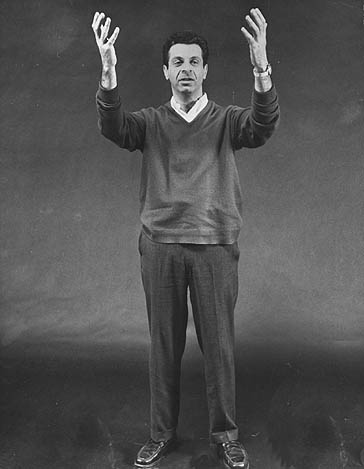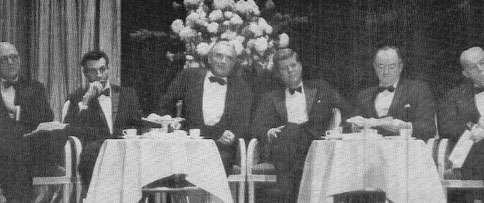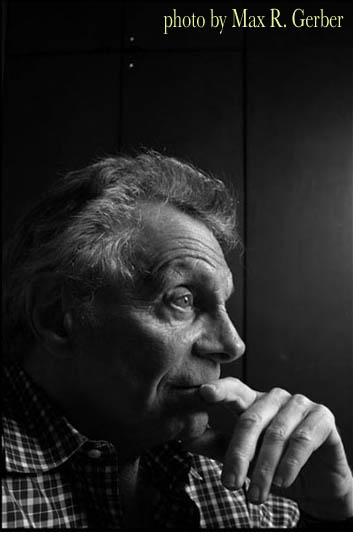|

When Mort Sahl got into comedy, he broke the mold: the mold of the nightclub comedian in a suit and tie, telling wife
jokes, exuding show biz polish. As everyone from Lenny Bruce to Woody Allen to Jay Leno admitted, it was Mort who influenced
them -- dressing casually in slacks and a sweater, talking about things that actually mattered, getting his points across
with a unique delivery that was nervous, staccato-sharp, hip and intimate -- the opposite of the swaggering top banana comic.
Born in Montreal, Sahl and his family soon moved to Los Angeles. There the boy won an American Legion Americanism Award
while a member of the ROTC. His father had been a court reporter and later an administrator with the FBI. Mort, attending
Belmont High School, hoped to go on to West Point, but was drafted and ended up in an Alaskan Air Force base. He got into
trouble for editing the newspaper "Poop from the Group," and was given 83 days of KP in a row. Still, he remained
solidly establishment-oriented, and after his Air Force years majored in city management and traffic engineering at the University
of Southern California, graduating in 1950.
After a few aimless years of writing and nearly starving, Sahl's girlfriend suggested he try stand-up in San Francisco
at the hip Hungry i. She told him, "The audiences are all intellects, which means if they understand you, great, and
if they don't, they will never admit it..." They didn't admit it. As Sahl recalled, the audience "threw pennies
at me -- and peanuts onto the stage. They were really savage." But the club owner didn't have the heart to fire him,
and so Sahl persisted and eventually the audience began to understand what he was doing.
They had been confused by Mort's mordant observational style. Instead of fast jokes, he offered satirical descriptions.
He told the crowd about conservatives dressing in charcoal gray suits "because modern science was looking for a color
more somber than black." He said these men usually wore a tie with "a large stick pin that seemed to go through
the body." While previous generations of comics set up their jokes with mechanical precision and blasted the punchline,
Mort left it to the audience to be smart enough to find the humor. It took them a moment to get a quick satiric jab like his
mention of "a magazine of obscure poetry -- called 'Whither.'"
The name "Hungry i" meant "hungry intellectual," and instead of fat jokes, skinny jokes or homely
jokes, Mort gave the crowd some intellectual lines: "I took a course at Cal called Statistical Analysis. And there was
a guy in the course who used to make up all his computations and he never used Sigma. He used his own initials. 'Cause he
was the standard deviation..."
One of his most popular bits at the time, pre-dating Woody Allen's "Take the Money and Run," was about a bank
robber who comes up against an intellectual teller. The robber hands him a note that says "act normal." The teller
writes back, "define your terms."
Sahl's delivery, one that fascinated Lenny Bruce, Woody Allen and so many more, was made up of free association, nervous
digression, jazz-like improvisations, one-word references, parenthetical stream of conscious commentary and a mosaic of ad-libs
and suddenly remembered set routines. Sometimes he seemed like a hip patient on a psychiatrist's couch, other times the cool
shrink himself. His trademark was the rolled up newspaper he carried on stage (a convenient place to hide new gags and reminders
of topics to cover). A nervous giggle and a dry, sarcastic laugh sometimes helped key the audience into "getting"
a particular line.
Sahl's stop and start cadence kept audiences off balance and intrigued: "I wanted to say a few words -- I have a
lot of hostility tonight to bring out here -- I wanted to say something on the President's press conference and this being
a primitive form of theatre -- my attempts to entertain you and take your minds off the fact that there was an explosion in
the shaft and we're trapped. Boy. Cliches...right? Exciting...Captain Beech arrived in the Triton. He had been underwater
for eighty three days. And he came up and that took our minds off the U-2. And President Eisenhower gave Captain Beech a medal
for being one of the few officers whose whereabouts he knows. And then nobody knew what to say. It's like "One of Our
Aircraft Is Missing." And one of our Presidents, in the opinion of many..."
In the late 50's and early 60's, it was unheard of to attack the President that way. Sahl was labelled "Will Rogers
with fangs." Rogers used to say "I never met a man I didn't like." Mort challenged, "Is there any group
I haven't offended?"
Fortunately for Sahl, the time was right for his type of comedy, and the liberal press, nightclub reviewers and patrons
at the hip clubs he played were all on his side. He dared to come up with lines like "I'm not so much interested in politics
as I am in overthrowing the government." His jokes against Senator McCarthy, President Eisenhower and Vice-President
Nixon were quoted in magazines all over the country, including a cover story in Time magazine -- a rare honor for a comedian
back then.

Mort was invited to important political and social events, as much of a presence as the leaders he satirized. He became one
of the first comedians to have best-selling record albums. At a time when topical humor was unavailable on late night TV,
people bought Mort's albums as they would a weekly news magazine and he seemed to come out with them almost as often.
Whatever Sahl said stirred controversy: "Maybe the Russians will steal our secrets -- then they'll be two years behind."
"I'm for capital punishment. You've got to execute people. How else are they going to learn?" "I went to my
dressing room between shows and an attorney for the NAACP was waiting for me. He wanted to know why I don't have any Negroes
in my act."
Writers searching for a word to describe him came up with "iconoclast," and Mort was exactly that. He said at
every election that it didn't matter who was elected -- "I will attack him." John F. Kennedy was elected -- and
Mort attacked. On his album "The New Frontier" he told of fans surprised at his Kennedy jokes. "We thought
(Kennedy's election) was what you wanted." His salty response: "You didn't have to do it for me!"
Ed Sullivan refused to let Mort tell Kennedy gags on his show. Sahl's bookings declined. The light-hearted "First
Family" parody album sold millions of copies; his "The New Frontier" a fraction of that.Ironically, after Kennedy's
death, when Sahl was one of the first and most vocal proponents of a conspiracy theory, his audience still turned away. Sahl
couldn't accept this. He had himself risked his life by attacking Senator McCarthy and President Eisenhower. Now he was once
again risking his own safety by challenging the Warren Commission -- and nobody would even listen.
Told repeatedly by nightclub and television bookers to stop talking about a conspiracy, Sahl tried to see their point
of view. He said, "According to Gallup 88 percent of the American people don't believe in the Warren Report. I certainly
wouldn't want it on my conscience that I disturbed the faith of the remaining 12 percent." Sahl's income sank from $400,000
a year to $19,000. Sahl refused to stop talking about the Warren Report -- which led some to declare that he'd lost his sense
of humor along with Lenny Bruce, whose club routines now centered mostly on his own legal battles. Lenny died on the battlefield.
For years, Mort was agonizingly missing in action.
With the escalation of the Vietnam War and the sinking popularity of Lyndon Johnson, Sahl's brand of fierce satire was
suddenly back in fashion. Acolytes like The Smothers Brothers booked Mort for their TV shows, and he put out one of his best
albums, "Anyway, Onward."
Sahl never forgot the backstabbing he endured during the Kennedy years, nor the bleakness of the period following Kennedy's
death. He described it all in the searing memoir/autobiography "Heartland." The book also briefly explored his early
years and relationships, territory that he'd rarely covered on stage or in print interviews.Admirers like Dick Cavett, Merv
Griffin and Steve Allen booked Sahl for television appearances in the 60's and 70's and he was still fiercely uncompromising,
often getting into heated battles with other guests on the shows as well as audience members.
Through the 60's Sahl had occasionally taken on acting roles, both in films and on TV shows including "Thriller"
and "Emergency." By the 80's he talked about "failing upward," earning a good salary for writing film
screenplays for top stars, He "ghosted" portions of some hit movies, but never got an actual screen credit for his
work. A legend in his own time, even without a lot of TV exposure (The Lenos and Lettermans figuring they could dole out political
satire nightly!) Sahl opened a successful one-man Broadway show in 1988, and has appeared in subsequent Broadway and off-Broadway
productions.
Critics have insisted that Mort's leaned a bit more to the conservative right in the 1990's. Though he's clearly offering
an older, more conservative satirical viewpoint, he's still very much the iconoclast who spared nobody. A typical line: "If
anybody comes up to you and says 'My kid is a conservative -- why is that" you say, "Remember in the 60's when we
told you if you kept using drugs your kids would be mutants?"
Sahl's one-liners still had punch: "What is a moderate Iranian? One who's run out of ammunition." He doesn't
care if he antagonizes the Leno/Letterman crowd -- he told them, "A Yuppie believes it's courageous to eat in a restaurant
that hasn't been reviewed yet."
And looking back on the political scene, he announced "Two hundred years ago, we had Jefferson, Washington, Ben Franklin
and Tom Paine, and there were four million people. Today we have 220 million, and look at our leaders...Darwin was wrong."

|

